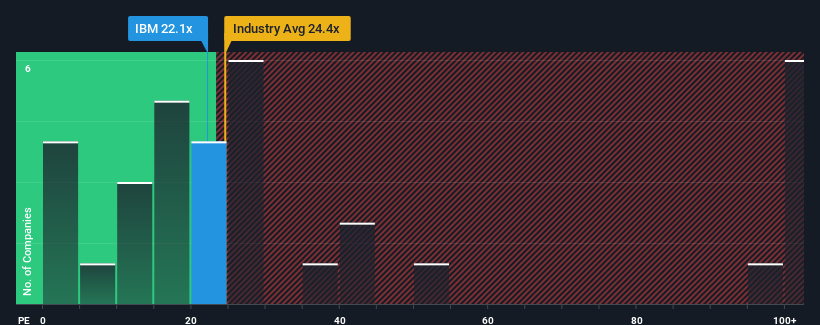- United States
- /
- IT
- /
- NYSE:IBM
International Business Machines Corporation's (NYSE:IBM) Popularity With Investors Is Under Threat From Overpricing

When close to half the companies in the United States have price-to-earnings ratios (or "P/E's") below 16x, you may consider International Business Machines Corporation (NYSE:IBM) as a stock to potentially avoid with its 22.1x P/E ratio. Although, it's not wise to just take the P/E at face value as there may be an explanation why it's as high as it is.
With its earnings growth in positive territory compared to the declining earnings of most other companies, International Business Machines has been doing quite well of late. It seems that many are expecting the company to continue defying the broader market adversity, which has increased investors’ willingness to pay up for the stock. You'd really hope so, otherwise you're paying a pretty hefty price for no particular reason.
See our latest analysis for International Business Machines

What Are Growth Metrics Telling Us About The High P/E?
In order to justify its P/E ratio, International Business Machines would need to produce impressive growth in excess of the market.
If we review the last year of earnings growth, the company posted a terrific increase of 318%. The strong recent performance means it was also able to grow EPS by 86% in total over the last three years. Therefore, it's fair to say the earnings growth recently has been superb for the company.
Turning to the outlook, the next three years should generate growth of 5.8% per year as estimated by the analysts watching the company. Meanwhile, the rest of the market is forecast to expand by 10% per year, which is noticeably more attractive.
In light of this, it's alarming that International Business Machines' P/E sits above the majority of other companies. Apparently many investors in the company are way more bullish than analysts indicate and aren't willing to let go of their stock at any price. There's a good chance these shareholders are setting themselves up for future disappointment if the P/E falls to levels more in line with the growth outlook.
What We Can Learn From International Business Machines' P/E?
Generally, our preference is to limit the use of the price-to-earnings ratio to establishing what the market thinks about the overall health of a company.
We've established that International Business Machines currently trades on a much higher than expected P/E since its forecast growth is lower than the wider market. When we see a weak earnings outlook with slower than market growth, we suspect the share price is at risk of declining, sending the high P/E lower. Unless these conditions improve markedly, it's very challenging to accept these prices as being reasonable.
And what about other risks? Every company has them, and we've spotted 2 warning signs for International Business Machines you should know about.
Of course, you might find a fantastic investment by looking at a few good candidates. So take a peek at this free list of companies with a strong growth track record, trading on a low P/E.
New: AI Stock Screener & Alerts
Our new AI Stock Screener scans the market every day to uncover opportunities.
• Dividend Powerhouses (3%+ Yield)
• Undervalued Small Caps with Insider Buying
• High growth Tech and AI Companies
Or build your own from over 50 metrics.
Have feedback on this article? Concerned about the content? Get in touch with us directly. Alternatively, email editorial-team (at) simplywallst.com.
This article by Simply Wall St is general in nature. We provide commentary based on historical data and analyst forecasts only using an unbiased methodology and our articles are not intended to be financial advice. It does not constitute a recommendation to buy or sell any stock, and does not take account of your objectives, or your financial situation. We aim to bring you long-term focused analysis driven by fundamental data. Note that our analysis may not factor in the latest price-sensitive company announcements or qualitative material. Simply Wall St has no position in any stocks mentioned.
About NYSE:IBM
International Business Machines
Provides integrated solutions and services in the Americas, Europe, the Middle East, Africa, and the Asia Pacific.
Adequate balance sheet average dividend payer.
Similar Companies
Market Insights
Community Narratives





